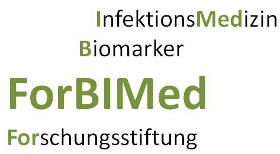FORBIMED
RESEARCH COLLABORATION - BIOMARKERS IN THE FIGHT AGAINST INFECTIOUS DISEASES

The association
Despite the constant availability of new medications, improved vaccines and antibiotics, infectious diseases often spread rapidly claiming many deaths even in modern industrialised nations. There are several reasons for the persistence of infectious diseases. Many pathogens are highly adaptable, often develop multiple resistance to antibiotics or 'escape the clutches' of conventional medicines and vaccines. It is biotechnology's duty to keep up to date with these dynamic challenges.
The objective of ForBIMed is to discover new, pathogen- and host-specific biomarkers that can serve as a basis for new diagnostics, therapeutics and vaccinations. With these ForBIMed aims to allow for a faster and simpler distinction between bacterial and viral infections, as well as between resistance profiles within the different groups of pathogens. In addition, the characterisation of host specific immune parameters, based on which the risk of a transplant rejection or a virus reactivation while a patient is immune suppressed is assessed, represents one of the main focal points of this project.
Network:
Within ForBIMed, 11 university research groups and 9 companies collaborate under the leadership of Dr. Ralf Wagner, PhD, Asoc. Prof. at the University of Regensburg in eleven project groups.
The universities and companies participating in this research cluster are:
- Universität Regensburg
- Friedrich-Alexander-Universität-Erlangen-Nürnberg (FAU)
- Ludwig-Maximilians-Universität München (LMU)
- Technische Universität München (TU)
- Hyglos GmbH, Bernried
- NovaTec Immundiagnostica GmbH, Dietzenbach
- Mikrogen GmbH, Neuried
- Bruker Daltonik GmbH, Bremen
- Lophius Biosciences GmbH, Regensburg
- Juno Therapeutics GmbH, München
- 4SC Discovery GmbH, Planegg-Martinsried
- AmVac Research GmbH, Martinsried
- SIRION BIOTECH GmbH, Martinsried

Organisation
Spokesperson
Second Spokesperson
Coordination
Head of Research Division
- Dr. Tanja Bauer
- Prof. Dr. med. Dirk Busch
- Prof. Dr. Frank Ebel
- PD Dr. Wolfgang Fischer
- Prof. Dr. Markus Gerhard
- Prof. Dr. Dr. André Gessner
- Professor Dr. Rainer Haas
- Prof. Dr. Manfred Marschall
- Prof. Dr. Ulrike Protzer
- Dr. Zsolt Ruzsics
- Prof. Dr. med. Sören Schubert
- Prof. Dr. Alexander Steinkasserer
Industry Partner
Partner
Scientific partner
- Klinikum der Universität Erlangen
- Ludwig-Maximilians-Universität München
- Technische Universität München
- Universität Regensburg
Fields of work
Projects
- D2 - Novel Antigens from the Duodenal Ulcer Promoting Gene (dupA-) Gene Locus as Biomarker for Optimization of the Serological Helicobacter Pylori Diagnostics
- D1 - Bacterial Permeability Increasing Protein (BPI) as a Novel Biomarker for Infections and Inflammation
- D3 - Development of Novel Diagnostic Procedures for the Detection of Invasive Fungal Infections
- D4 - Detection of Antibiotic and Antimycotic Resistance in vitro and in vivo Via MALDI-TOF MS
- D5 - Recombinant Polypeptides with Optimized T-Cell Activating Properties
- D6 - T-Cell Diagnostics for Individualized Therapy Following Transplantation
- D7 - Development of a Koff-Rate Assay for Diagnostic Application
- I1 - Identification of Key Positions in Virus-Specific Cellular Signaling as Markers for Therapy, Immunity and Diagnostics
- I2 - Characterization of Immunological Biomarkers During Antiviral Therapy by Use of Cellular Targets
- I3 - Development of Immunological Assays for Immunomonitoring in the Context of a Viral Vaccination Platform
- I4 - Replicon-Technology for Assessment and Production of Adenoviruses with a High Security Profile
News
Press
-
24.11.2015
Verbundprojekt wird verlängert
more -
11.03.2015
Die Bayerische Forschungsallianz auf dem Forum Life Science 2015
more -
01.02.2014
Infektionen schneller und gezielter bekämpfen
more -
17.01.2014
Mit Biomarkern gegen Infektionen
more -
01.01.2014
Infektionen schneller und gezielter bekämpfen
more -
16.12.2013
ForBIMed: Infektionen schneller und gezielter bekämpfen
more -
15.10.2013
Erfolgreich durch gemeinsames Forschen
more -
03.07.2013
Zweite Förderrunde der Bayerischen Forschungsstiftung 2013: rund 1,8 Mio. Euro für den Forschungsverbund Biomarker in der Infektionsmedizin (ForBIMed)
more
Contact
Spokesperson:
Prof. Dr. Ralf Wagner
Molekulare Mikrobiologie (Virologie)
Institut für Medizinische Mikrobiologie und Hygiene
Universität Regensburg
Administration:
Bettina Gärber
Molekulare Mikrobiologie (Virologie)
Institut für Medizinische Mikrobiologie und Hygiene
Universität Regensburg
Franz-Josef-Strauß-Allee 11
93053 Regensburg
E-Mail: <link mail>bettina.gaerber@klinik.uni-regensburg.de
Internet: <link https: www.bayfor.org de unsere-netzwerke bayerische-forschungsverbuende forschungsverbuende a _blank>www.bayfor.org/forbimed



